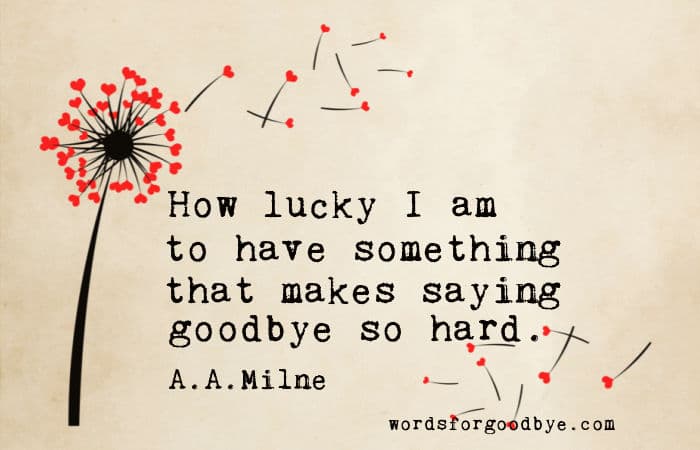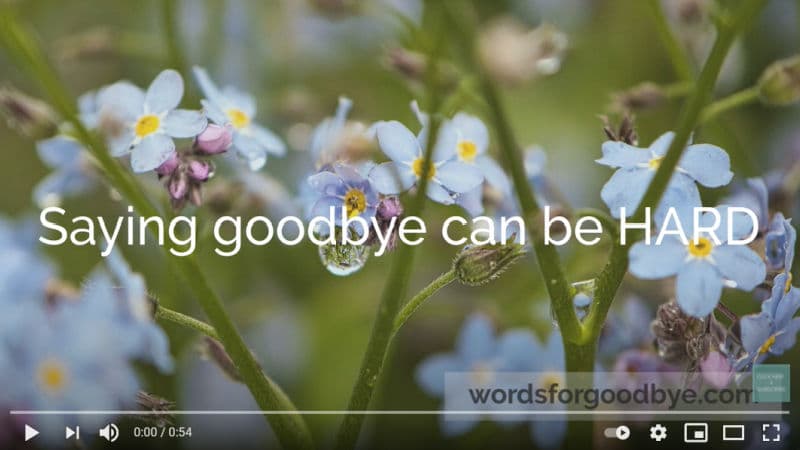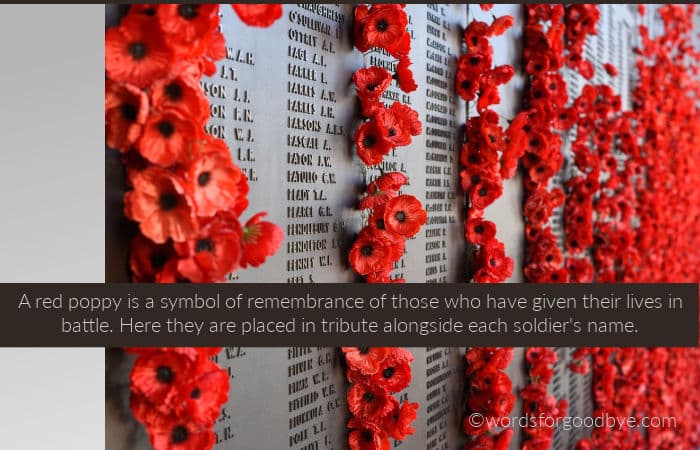- HOME ›
- Goodbye speech examples
Goodbye speech examples
Read speeches from others & share the farewell, tribute, eulogy, memorial or retirement speech you gave
By: Susan Dugdale
Have you struggled to find the right words to express your thoughts and feelings at the funeral of a much loved friend or family member?
Have you ever waited too long for inspiration to give you something meaningful to say to mark the departure of an admired colleague? And then, found yourself offering tired clichés?
Have you let an opportunity to say goodbye go because saying nothing seemed preferable to saying something and getting wrong?
I have. I can say yes to all three questions. And I've witnessed others behaving exactly the same way in similar settings.
Because I know reading example speeches others have given would give you a place to start thinking about how to say what you want to, I've issued an invitation for people to submit their eulogies, farewell and retirement speeches. You'll find that at the foot of the page.
The goal is to build a collection of goodbye speeches: real speeches from real people used in real situations to help make our goodbyes better for others, as well as ourselves.
What is it about saying goodbye we find so hard?
In a word: endings.
Endings signify the close of a relationship that was meaningful to us. And endings, both expected and unexpected, can be painful. Very painful. Exceedingly so, if it is the death is the loss of someone dear to us: a much loved friend, or a close family member.
Although we know life is never static, and nothing ever remains the same, that knowledge will not protect us from feeling the pain of parting.
Things we do instead of saying goodbye thoughtfully
Does it amaze you that you can be grownup in some areas of your life, and act like a nervous, scared child in others? Me, too.
As I get older I see more clearly the aspects of myself that are stuck on being a kid: sometimes a defiantly stroppy one.
For instance, I do not want to hear about how some forms of exercise are good for me. Ever. If I allow the child in me out to play I could be tempted to put my fingers in my ears, fold my arms, turn on my heels and walk away, if you insist on talking yoga, Pilates, or swimming to me.
And if you try to make arrangements to meet me at a gym while the kid is running the show, it's quite likely I'll 'forget'. Or I'll get angry with you. Snittty and snarky over silly things like the way you slurp your coffee and always leave the door open. Or I'll become remote, not really interested in you anymore. Maybe I'll even go out of my way to avoid you completely. Or I might weep and wail and tell you a sad story about a terrible event that happened way back. I've never got over it, never moved on, and I can't face a gym ever, ever again.
Some people behave in any, or all, of those ways when presented with situations which may expose their limitations. For me it's been mostly physical activities requiring flexibility and coordination triggering the temptation to run and hide. For others, it's acknowledging departures, especially in public, where a speech may be required. I can put my hand up for a few of those too, a long time ago now.
We do these things when we're feeling vulnerable, or insecure. When we fear letting ourselves and others down. When we're afraid of being judged. And particularly, when we don't know how to say we don't feel capable of acquitting ourselves fittingly. None of them removes the problem. All they do is underline feelings of inadequacy and add another layer of guilt.
Unfortunately, what we seldom say to ourselves, when faced with a challenge, is that feeling: conflicted, vulnerability, insecurity, doubt …etc. is completely normal. What we do with those feelings makes a very big difference between being able to move on and not.
The value of getting goodbye right
Studies* show that when people experience a well-rounded goodbye to a phase of life; that is they have done everything to fully complete whatever they can, that no loose ends are left dangling, they move on more easily. These people can live positively and fully in the present.
They have fewer regrets. There is less looking back, wishing they'd done things differently and feeling guilty. The sense of closure, completion, they have enables them to remember the past without becoming mired in it.
References
*Saying goodbye and saying it well: APA Journals Article Spotlight® Summaries of recent APA Journals articles (April 29,2019) For more: Schwörer, B., Krott, N. R., & Oettingen, G. (2020). Saying goodbye and saying it well: Consequences of a (not) well-rounded ending. Motivation Science, 6(1), 21–33. http://dx.doi.org/10.1037/mot0000126
Until Next Time: The Benefit of Healthy Goodbyes: Mentalhelp.net
What is a well-rounded goodbye?
Saying goodbye well can involve many things. If you're either leaving or being left it is healthy and helpful to:
- give yourself time to talk openly with all the people you need to, which could include giving a speech at a gathering to mark the occasion
- acknowledge your feelings, including the sad, or difficult, ones
- understand parting is a process and that it will take time to adjust
- select something small and tangible as a touchstone to keep as a reminder of the time you've shared together

When we don't say goodbye
I know from experience what it feels like to have missed saying goodbye properly. It's not comfortable.
In some instances the discomfort has been purely down to me. I kidded myself I could pull words together at a moment's notice. That they would be eloquent. That they would express everything I wanted them to. They weren't and they didn't.
Or I avoided the situation entirely, telling myself a mixed bag of untruths: that it didn't really matter, that no-one was interested in formal goodbyes, that the people who meant something to me would know that regardless, and I didn't have to say it … Blah, blah.
And sometimes important people in my life have gone, died, without warning. Getting to grips with that has been a challenge, each time it's happened.
The big goal of this site
The value of getting it as right as you possibly can, whenever you can, is incalculable. It's a service to yourself and others.
While I can't help you with all aspects of saying goodbye, I can with speeches.
It's my hope, that over time, I'll be able to fill this site with examples of farewell speeches of all kinds.
There'll be retirement speeches, farewell speeches for people leaving one position and going to another, memorial speeches, tributes, eulogies... (More than just the eulogy samples I have written.) And all these speeches will help people say better goodbyes. They'll be references, kick off points, to assist with getting started to write what they need to. Which brings me to you.
Could you help others give a better goodbye speech?
Circumstances change for all sorts of reasons. And endings of various kinds are often the result. As we know, some of them are hugely important. They are major events in our lives: so big we want to mark them, for ourselves and each other, with a speech.
Please feel free to use this opportunity to share with me, and the other people who come looking for inspiration and help, the goodbye speech you have written.
Maybe you've written a memorial speech, a tribute or eulogy.
Perhaps you've prepared a farewell speech for a much loved and respected employee who is leaving to take up another position. Or perhaps it's you saying farewell to colleagues you've worked with for a long time.
Or it could be a retirement speech to mark the end of a long career.
All of these are very welcome. With your help we'll create a collection that will play an important part in empowering people to embrace endings and transitions, despite the inevitable pain some of them cause.
Your speech of goodbye will have its own page which you can come back to read and share with family and friends, if you choose to.
As you fill out each section, click on the ? for more help.

